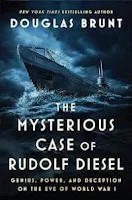“The Mysterious Case of Rudolph Diesel” by Douglas Brunt – The Genius Vanishes
Short Summary
Douglas Brunt veered off the path well-known to him and chose to dabble in non-fiction when he recently published The Mysterious Case of Rudolph Diesel. In it, he points his attention to the often overlooked inventor of engine by the same name, giving us a window into his complicated life, leading us all the way to its known conclusion, which leaves all too much room for speculation.
Douglas Brunt Opens a Revolutionary's Mind
Out of all the factors which move our history forward, none have been as prominent as individual geniuses if we're talking about the last century. Technological innovations kept springing up every few years to the point where many began to see the world turning into something completely unrecognizable. In his book titled The Mysterious Case of Rudolph Diesel, Douglas Brunt takes a deep dive into the life of an overlooked genius whose ultimate fate raised many questions.
Off the top of my head, if I was asked about the inventions which had the greatest impact on our development during the first half of the twentieth century, I would probably be hard-pressed to specifically name the Diesel engine. And yet, this truly was the case, and in 1913 Rudolph Diesel was on the verge of adding his own major contribution to the industrial revolution.
Born in March of 1858 in Paris, Rudolph was the second of three children to Bavarian immigrants, and while they did not live in total abject poverty, life for them was far from easy, forcing him to work with his father from a very young age. Gifted with a brilliant mind and a commendable work ethic, slowly but surely he honed his talents as best he could.
Unfortunately for him and his family, when the Franco-Prussian war came they, along with countless other Bavarians, were forced out of France. The family settled in London, but soon sent the twelve-year-old Rudolph away to live with his aunt and uncle in Germany, where he would thankfully finally find a solid foothold from which to launch himself.
After receiving a merit scholarship from the Royal Bavarian Polytechnic of Munich, he went to work, and eventually, closer to the First World War, he finally produced the designs for his famous Diesel engine, which earned him powerful enemies in the Kaiser as well as John D. Rockefeller. As Rudolph grew concerned about Germany's growing military influence, he sailed on to Great Britain in hopes of helping them revive their submarine program, when he disappeared somewhere in the English channel... and perhaps, as Douglas Brunt argues, his fate wasn't as tragic as it first appeared.
 |
Rudolph Diesel |
An Account of Industrialization in The Mysterious Case of Rudolph Diesel
I think it goes without saying that the primary mystery in this book, so-to-speak, is what fate ultimately befell the famous inventor, and why there might be reasons to doubt the official version of events. However, while the author might be dangling this carrot to get you into the novel, you ought to know it's something which is treated more towards the end.
There is a whole lot more to The Mysterious Case of Rudolph Diesel than what happened to the man in 1913, and Douglas Brunt doesn't skimp on giving us valuable insight into the man's formative years. He does his best to give us a complete and detailed image of what circumstances he was born into, what his family life was like, as well as the challenges they had to face due to their social class.
As Douglas Brunt traces Diesel's life from its beginning, he also offers a rather captivating panoramic view of late 19th and early 20th century Europe, describing in great depth a world quickly switching over from Kerosene lamps to electric lighting, from manual labour to machine automation. Though today these inventions might seem primitive and taken for granted, in this book we get a very real sense of just how impactful and revolutionary they actually were, even when compared with today's grandiose leaps.
In my opinion, Douglas Brunt's approach to examining one man's life is one I wish others would replicate, or at least study for their own betterment. He understands that a person is not only the result of their own inner world, but also of the family they're born into, the people who end up surrounding them, the community and nationality they belong to, not to mention, the country they're a citizen of.
The more we learn about Diesel, the more we learn about the world around him, and vice-versa. In the end, we have rather accurate depictions of both elements, which leads to a much greater understanding of how they impacted each other. In other words, Brunt's approach to writing this biography gave me an immense appreciation for Rudolph Diesel's inventions, and made me understand beyond the shadow of a doubt why he was such an important person.
Conspiracies and Power Struggles
Though Rudolph might have been born a relatively long time before the First World War, it still wasn't far enough not to be caught in the sprawling tendrils of its labyrinthine web of politics, betrayals and allegiances. What's more, being a citizen of multiple countries and a man of renown, Diesel attracted the attention of quite a few people.
Quite notably, we learn about how he made enemies with Kaiser Wilhelm II of Germany, as well as John D. Rockefeller, the founder of Standard Oil and, at the time, the richest man in the entire world. While the former wanted to use Diesel's inventions to strengthen his own military, the latter was afraid of Rudolph's new engine making his own product obsolete.
In the latter parts of The Mysterious Case of Rudolph Diesel, Douglas Brunt demonstrates what it's like being stuck between the hammer and the anvil. The pressures keep mounting on Rudolph to do what he believes is right and best for mankind in spite of growing discontent and danger around him, and in my opinion, the author did a good job in exploring what his frame of mind might have been like during that time, and how it might have pushed him to make a decision to save himself.
Diving into the actual mystery of his disappearance, public knowledge states that in 1913, he was on his way to London to establish a new company, which would hopefully help to revive the country's failing submarine program. However, he never showed up, and it was assumed that his ship was sunk in the English channel.
Douglas Brunt, however, makes his case for a rather interesting possibility: the staging of his death. I relay here all of the author's arguments and their many details, but I must commend him on having obviously conducted as thorough of an investigation as he possibly could have, to the point where even if I can't be sure of it, I certainly can't argue against it. This little-yet-essential element elevates this book above the status of a regular biography; as much it's an account of a life and the world it lived in, it is also an attempt to solve a real-life mystery which never did have a proper conclusion.
The Final Verdict
The Mysterious Case of Rudolph Diesel by Douglas Brunt is a fantastic history book for anyone interested in late 18th and early 19th century Europe, as well as the life and fate of one of its most pivotal geniuses. Diving deep into known facts and possibilities, it makes for a compelling, educative, and at times, even exciting read.
If you're specifically interested in learning about Rudolph Diesel, or simply like the idea of diving into the real life of a genius inventor (with a good enigma to cap it off), then I highly recommend you check this novel out.
 | Douglas BruntPersonal site Douglas Brunt veered off the path well-known to him and chose to dabble in non-fiction when he recently published The Mysterious Case of Rudolph Diesel. In it, he points his attention to the often overlooked inventor of engine by the same name, giving us a window into his complicated life, leading us all the way to its known conclusion, which leaves all too much room for speculation. |








Comments
Post a Comment